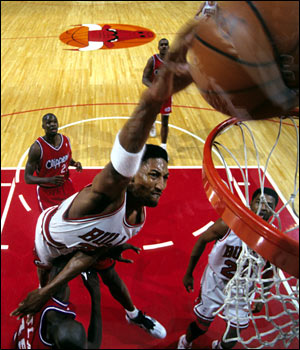
This past Friday the Chicago Bulls retired Scottie Pippen's #33. I watched a video of the halftime ceremony online later that night, and I was overrun with nostalgia.
From May 1993 to June 1998, I was a Chicago Bulls fanatic. I never made it to Chicago Stadium, and I've yet to be inside the United Center, but I watched them on TV all the time. They were just a fascinating team to watch. Sure, it helped that they were winners, but I also enjoyed the team chemistry and personalities (especially for the 2nd 3-peat).
Looking back, perhaps I spent too much time watching the Bulls, but you know what? I sure enjoyed it while it lasted. Just thinking back on the team that won 72 games... wow, what a year. It's hard to compare different teams from different eras, but that '96 Bulls team has to be considered the greatest NBA team of all time if you insist on trying to pick one.
For that '96 Bulls team, having Michael Jordan, the greatest all-around player and clutch performer in NBA history was a good start. (If NBA history teaches us anything, it's that you don't bet against Michael Jordan in the prime of his NBA career.) But while that team started with Jordan, it certainly didn't end there. At the other starting guard position they had Ron Harper, who was bigger than most guards and able to play great defense, yet knew enough to get out of Jordan's way on offense. Coming off the bench at guard they had Steve Kerr (to this day the highest % 3-point shooter in NBA history), and Randy Brown (the quickest defender on that Bulls team, which is saying something).
If the team had a weakness, it was at the center position. However, I purposely used the word if. When people try to find fault with the '96 Bulls, they usually attack Luc Longley as being an average center who would be dominated by the greats throughout history (Wilt, Russell, Kareem, etc.) I disagree. Luc Longley was a good center on offense and defense. Moreover, he fit well into the Bulls' team strategy.
On defense, Longley could typically neutralize the other team's center. On offense, he was a good passer, good jump shooter, and was an accurate free throw shooter (even in the clutch). With 2 minutes left in a close game, if you fouled Shaq, it's hold your breath. If you fouled Longley, it's 2 points for the Bulls.
When Oscar Robinson was asked whether Wilt Chamberlain was the best ever, he replied, "The books don't lie." I couldn't agree more. Chamberlain has two titles. Longley has three.
Okay, so I'm not saying Longley's better than Wilt. But consider this: Wilt played the game back in the 1890s (okay, more like the 1960s and early 70s, but you get my point) when there weren't many centers his size (7' 1" 275 lbs). In short, Wilt wasn't dominating guys like Patrick Ewing, David Robinson, or Hakeem Olajuwon. He was dominating guys like Jack Haley.
As Exhibit A below, I present to you an "action" shot from Wilt's storied 100-point night:
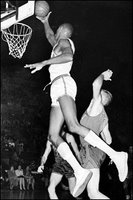
In Exhibit B below, apparently this was the most impressive photo NBA.com could find of Wilt Chamberlain's career:
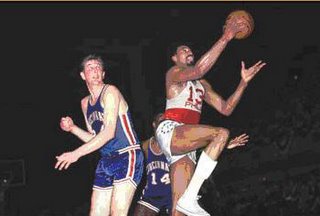 Wait a second, who's that on defense? Nick Smith?
Wait a second, who's that on defense? Nick Smith?Furthermore, Wilt's career free throw percentage is two points lower than Shaq's. I'd argue that Shaq is a more dominant center than Wilt; and Tim Duncan is a better team basketball player than either. Yet none of them would have caused Luc Longley to lose much sleep while he was on the '96 Bulls.
Coming off the bench at center, the Bulls had Bill Wennington who was a phenomenal shooter (great jumper and 86% free throw accuracy), but a liability on defense and not as good a passer as Longley. Wennington wouldn't excite you as a starting center, but as a back up, he was one of the best in the league.
At power forward, the Bulls only had the greatest natural rebounder of all time, Dennis Rodman, aka "The Worm." Rodman did a lot of the little things that the average fan doesn't
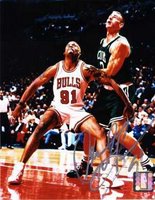 notice on the basketball court. According to some people, Rodman's basketball I.Q. was second to none. He knew how to move without the ball, make the best pass, and get inside his opponent's head to attain a psychological advantage. Rodman could also play defense against guys who were bigger in size. I remember he sometimes would guard Shaq - and relatively well I might add.
notice on the basketball court. According to some people, Rodman's basketball I.Q. was second to none. He knew how to move without the ball, make the best pass, and get inside his opponent's head to attain a psychological advantage. Rodman could also play defense against guys who were bigger in size. I remember he sometimes would guard Shaq - and relatively well I might add.Coming off the bench at forward was Toni Kukoc, who would have started on almost any other NBA team in history. Any time he touched the ball on offense, he was a 6' 11" triple threat to shoot, pass, or dribble.
Of course, having all of these talented players doesn't mean anything if you can't get them to work together as a team. Phil Jackson, the head coach, did a masterful job of handling the egos and differing personalities. He and his staff also worked wonders with the X's and O's (six championships speaks for itself).
And if that weren't enough, they also had a guy who started at small forward who wasn't half bad. Sure, he didn't play ball in junior high and he was mainly the water boy his junior year in high school. He ended up going to a tiny college in Arkansas without a scholarship, but somehow made it to the Bulls and did okay. Of course, I'm talking about Scottie Pippen, the most accomplished small forward in NBA history.
Pippen was an amazing athlete. At 6' 7", he had long arms (7' wing span), but was also very quick. While he wasn't the best shooter in the world, he could dribble around people and dunk with the best of them. (Side note: Did you know that Pip taught MJ how to dunk from the corner using his left hand?) (Side note 2: I never hear people comment on this, but I noticed that Pippen had a knack for going glass in the crunch. At about a 45 degree angle from the basket, up to 15 feet away, he seemed to be about 80% accuracy when he chose to go glass. I specifically remember many occassions when the Bulls needed a big bucket, he would go to this play with a high rate of success. However, he didn't do this very often -- only on "special" occassions. Has anyone else noticed this or am I making this up?)
While Pip's offense was great, his defense was exceptional. He was every bit the defender that Jordan was, and ironically, if there was one person in the league whose defensive skills could have slowed down Jordan's offense, it was Pippen. But fortunately for Chicago fans, Pippen and Jordan were working with each other, not against each other.
Job well done, #23 & #33. Rest those numbers in peace.
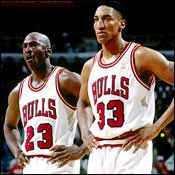

4 comments:
Wow, great memories, Greg. Although I was not a true Bulls fan, I was pulling for them.
I loved the analysis of the game in Wilt's day versus now. So true.
I echo westy's comments. Writing this post was a remarkable feat, Greg. I remember I used to tell kids I liked Pip better than Jordan, because I felt Scottie got no love. I also would like to mention Horace Grant's name; his athleticism enabled those early championship Bulls teams to use Pip, MJ, and Grant in a nasty pressing defense.
Glad you guys liked the post. Thanks.
>>Pip, MJ, and Grant in a nasty pressing defense.<<
Ah, yes, the dreaded Doberman Defense.
BTW, I've just realized that I neglected to mention Jerry Krause's role in assembling those teams. While he wasn't exactly Mr. Popular (especially with Pip, MJ, Grant, etc.), I do think that Krause was a top notch general manager. The biggest knock on him was that he inherited Jordan (ie, Rod Thorn drafted Jordan, then Krause got the GM job later). But hey, that's not his fault.
And finally, apparently even rookie center Andrew Bogut is a Luc Longley hater.
Remember that although Wilt played against inferior competition, he also did not have the benefit of improved nutrition, training, etc. that today's athletes have. The use of contemporaries as a measuring stick helps remove other factors from the comparison. As for athleticism, I believe that basketball changed rules for Wilt, including one that did not allow players to dunk their free throws (Wilt was planning on just broad jumping and dunking from the free throw line for his free throws). Remember - MJ needed a good running start for that dunk. The more revealing rule change was the rule against offensive goaltending that was created largely for Wilt. The only rule that comes to mind that was made because of MJ? Anti-gambling in the NBA :-)
-Chairman
Post a Comment